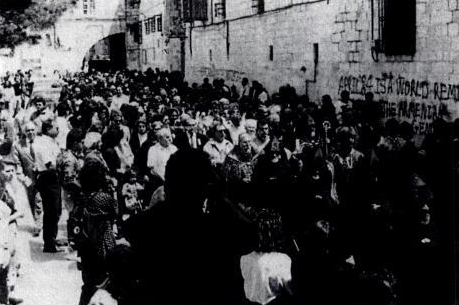
A century since the systematic slaughter of 1.5 million Armenians, and over half a century since 6 million Jews were killed in the Holocaust, mass atrocities continue to take place across the globe, without any sign of stopping. In March, human rights investigators for the United Nations disclosed that the Islamic State of Iraq and Greater Syria’s persecution and killings of Yazidis, a religious minority in Northern Iraq, appeared to be “clearly orchestrated” and gave cause for alarm at a probable genocide.

Meanwhile, Nigeria has made the list of countries monitored by Genocide Watch after the militant extremist group Boko Haram kidnapped more than 200 young girls last April.
Many cite the famous Edmund Burke quote—“the only thing necessary for the triumph of evil is for good men to do nothing.” But what exactly can we do? First, let’s understand how the seeds of mass atrocities begin to take root.
In advance of the Zócalo/UCLA “Thinking L.A.” event, “Why Can’t We Stop Genocide?,” we asked scholars and authorities on genocide prevention: What are the legal, political, cultural, economic, and historical conditions that lead to genocide?

Genocide does not arise in a vacuum. As I always tell my audience when I speak on this topic, people do not just get up one day and want to systematically murder their neighbors.
Genocide is always preceded by a number of steps, including state sanctioned discrimination of the would-be target group, a dehumanization process in which the target group is portrayed as the “other” or the “enemy,” and a culture of impunity.
Furthermore, genocide happens under the supervision of a government whose determination to maintain power does not exclude an extermination plan. Finally, genocide is enabled by the silence of an international community, which believes that preventing or recognizing a particular genocide is not in its economic or political interest.
The case of the 1994 genocide in Rwanda is but one illustration of this now widely recognized pattern.
Prior to the genocide, Tutsis, Rwanda’s minority ethnic group, suffered state sanctioned discrimination within every aspect of the Rwandan society. To carry out the systemic discrimination, the then-Hutu-led government used an ethnicity-based ID card system, which had roots in colonialism.
Decades before the genocide, a culture of anti-Tutsi propaganda had indoctrinated Hutu children into seeing violence against Tutsi people as acceptable. A couple of years before the genocide begun, the government carried out a dehumanization campaign in which Tutsis were portrayed as “snakes” and “cockroaches.”
As the genocide was being planned, Romeo Dallaire, then head of the UN Peacekeeping mission in Rwanda, sent cables to the UN Security Council warning of the impending genocide. Members of the UN Security Council certainly had the means to prevent the 1994 genocide in Rwanda, but as with a number of other genocides, there was simply no political will to do so.
If we are to prevent future genocides, we can no longer afford to be silent and indifferent to a potential genocide. We must pay attention to the above-mentioned patterns, which precede the actual killings and must heed the warnings before it is too late. We must cultivate a culture where we understand that protecting any group of people from becoming victims of mass murder is in everyone’s best interests.
Jacqueline Murekatete is a survivor of the 1994 genocide in Rwanda, an attorney, and an internationally recognized human rights activist. Follow Murekatete’s work on Facebook and via Twitter @jmurekatete.

The Czech author Milan Kundera once wrote, “the struggle of man against power is the struggle of memory against forgetting.” This is a year of sad centennials, including the conjoined commemorations of the allied invasion of Gallipoli during World War I and the Armenian genocide.
For Australians and New Zealanders, April 25, 1915, Anzac Day, represents the most hallowed day in our shared military history. But I don’t recall any schoolteacher ever explaining to me that as the Anzacs stormed Gallipoli, leading politicians within the Ottoman Empire were preparing to extirpate Armenian Christians. On the night of April 24, as the Anzacs approached the Dardenelles, the arrest of Armenian intellectuals began. Soon after, the massacres and mass deportations commenced. A genocide that would result in the deaths of more than 1 million Armenians was underway.
Most Turkish perpetrators escaped punishment after World War I. Impunity begat impunity. From the killing fields of Cambodia to Rwanda or Bosnia, mass atrocity crimes were generally met with international diplomatic passivity throughout the 20th century. The new millennium didn’t start much better. The barren wastelands of Darfur provided yet another stain upon our conscience.
Amidst the political darkness, however, there has been some normative light. In 2005, the principle of the Responsibility to Protect (or “R2P”) was unanimously adopted at the UN’s World Summit, the largest gathering of heads of state and government in history. The basis of R2P is that all humans should be protected from the four mass atrocity crimes—genocide, war crimes, ethnic cleansing, and crimes against humanity. R2P urges an end to impunity, inaction and amnesia regarding atrocities.
That is why Kundera’s words resonate. The denial of past atrocities undermines our collective attempt to prevent similar crimes today. One doesn’t have to be Armenian to be moved by events 100 years ago or to be disturbed by the ongoing denial that genocide occurred. One only has to be human.
Dr. Simon Adams is executive director of the Global Centre for the Responsibility to Protect, a civil society organization that works with the UN Security Council on preventing mass atrocities. Adams has worked in South Africa, Rwanda, East Timor, Northern Ireland and elsewhere, and is the author of four books.

After the Holocaust, world leaders vowed they would “never again” stand by while millions of innocent people were slaughtered. Yet genocides have happened over and over again—in Cambodia, Bosnia, Rwanda, Guatemala, East Timor, Darfur—and volatile conditions across the world today threaten to escalate into similar horrors.
Genocide is the deliberate intent to destroy, in whole or in part, a national, ethnic, racial, or religious group. Yet national, ethnic, racial, or religious differences alone do not make people slaughter their friends, neighbors, co-workers, or even their own family members.
Under what conditions, then, will state leaders direct military organizations and ordinary people to exterminate specific groups? There is a common theme as a driver of genocide: elites’ efforts to maintain political and economic control.
During the Ottoman Empire, the ruling Turks lost 75 percent of their territory in a few weeks, in enormous military defeats. Refugees returned from those lost lands starving and in crisis. The government needed a scapegoat, so they blamed everything on dangerous Christians—especially the Armenians. The result: a genocide in 1915 of 1.5 million Armenians.
In Rwanda during the 1990s, the ethnic Hutu-led government was reeling from a civil war, a devastated economy, and a rapidly-increasing population facing dire food shortages. The minority Tutsis—despite having lived peacefully with the Hutus for generations—were blamed. The result: a genocide of more than 800,000 people in 100 brutal days.
We always portray genocide as having occurred because people hate those of a different faith or background or race. It’s easy to look at these characteristics as causes, but then governments escape with impunity.
Although we can teach people to accept one another, this won’t change large-scale malnutrition, economic despair, and political instability. It is only through improving these root causes, through promoting good governance, adequate food, economic security, and hopeful futures, that we can make “never again” mean “never.”
Ellen Kennedy is the founder and executive director of World Without Genocide at William Mitchell College of Law, St. Paul, MN. The human rights organization provides education on genocides and atrocity crimes in the past and those occurring today and advocates at local, state, and national levels.

Decades of research have provided a solid understanding of the causes of genocide, broadly defined as the intentional destruction of a group in whole or in part. Although historical cases vary in numerous ways—there are crucial differences between the genocides of Rwanda, Cambodia, the Ottoman Empire, and the Holocaust—we can identify four general conditions.
First, most genocides are preceded by histories of discrimination and unpunished violence against the targeted group. In pre-Nazi Europe, Jews faced decades of discrimination and even periodic killings, especially in Eastern Europe. In Rwanda, Tutsi were dehumanized and occasionally massacred in the decades prior to the 1994 genocide.
Second, genocide is normally carried out by leaders of authoritarian states or insurgent groups (like ISIS) with radical political ideologies that frame victims as existential enemies. The Armenian genocide, for example, was carried out by Turkish leaders whose racist ideology portrayed Armenians as dangerous traitors.
Third, significant social crises may create the context for genocidal violence. Revolution, massive economic upheaval, and especially war increase collective fear and acculturate a society to violence. Profound crises also make it easier to scapegoat an already vulnerable group and thus justify violent targeting. Consider how the extermination of Armenians occurred during World War I, the Holocaust during World War II, and the Rwandan genocide during a civil war.
Finally, international context is important. External powers can play a pivotal role in stopping—or abetting—genocide. For example, Western powers and the United Nations failed Rwandans by removing peacekeepers as the violence started. In other cases, foreign powers have actively supported genocidal regimes.
These are the general conditions for genocide. We know much about its specific causes, but still have far to go in preventing it. Sadly, “never again” has yet to become a reality.
Ernesto Verdeja is associate professor of political science and peace studies at the University of Notre Dame. His research focuses on the causes of genocide and mass violence, and post-conflict justice, and reconciliation.

Can history, politics, economics, legal systems, and culture all play a role in genocide? Yes. But they don’t cause it.
Contrary to what some pundits would have you believe, there are no “ancient ethnic hatreds.” Certain nationalities do not have a predilection for mass murder. “They” have not been killing each other for centuries. Such theories might offer false comfort to those shocked at the “sudden” death of millions, or provide convenient cover to politicians looking for excuses to not take action, but there’s little evidence to back them up.
History doesn’t kill people. Culture can’t pull the trigger. You might as well blame the weather.
Genocides and mass atrocities almost always target a specific ethnic, religious, or political group, but they are never spontaneous. People don’t wake up one day and start butchering their neighbors because they don’t like the way they look. They have to be taught to hate or fear. And, as the historian Benjamin Valentino has observed, someone—whether one individual or a small group—has to conclude that targeting members of a particular group is the only means capable of achieving a specific end.
Sometimes, as in Cambodia and Nazi Germany, it’s a radical ideological vision of a “pure” society. Sometimes, as in Yugoslavia and the Ottoman Empire, it’s a particularly virulent strain of nationalism. And sometimes, as in Rwanda and Syria, it’s simply because those in charge conclude that killing lots of people is the only way to stay in charge.
That said, genocidal leaders don’t operate in a vacuum. Scholars have identified certain external factors—particularly war, impunity for past crimes, and regime fragility—that can influence or accelerate the decision to kill.
Nor do perpetrators act in isolation: there are always plenty of ordinary men and women who—whether because of careerism, score settling, fear of retribution, or promise of financial gain—will run the camps, pack the gas chambers, and join the firing squads.
But in the end, machetes don’t just hand themselves out. Someone has to give the order.
Charles J. Brown is managing director of Strategy for Humanity and the Leonard and Sophie Davis Genocide Prevention Fellow at the United States Holocaust Memorial Museum. From 2012 to 2014, he served in the Obama Administration as senior advisor for atrocity prevention and response in the U.S. Department of Defense.

Having spent most of my career in conflict zones, I try to avoid generalities in international relations. In my experience, applying lessons from one crisis to another can be a formula for disaster.
There is, however, one factor common to genocide, and that is war. The Ottomans began killing Armenians to eliminate a potential fifth column during World War I. It was under the cover of a Second World War that the Nazis converted anti-Semitism into the Final Solution. If Richard Nixon hadn’t expanded the Vietnam War into Cambodia in 1970, the Khmer Rouge probably would have remained a fringe movement.
In 1987 in northern Iraq, I happened on the beginning of Saddam’s genocide against the Kurds. At the time, the Reagan Administration excused Saddam’s acts as operational necessity during the Iran-Iraq War. And, it was the U.S. invasion that opened the door for al-Qaeda—and its genocidal offspring ISIL—to enter Iraq. Neither were in the country in 2003.
In some countries where genocide has taken place, there is an ongoing history of ethnic or religious conflict—but not always. As ambassador to Croatia during the war in the 1990s, Serbs and Croats often told me that they never even knew the ethnicity or religious background of their neighbors. Yet, in the war, some participated in the ethnic cleansing of their communities and many supported the nationalist regimes that promoted ethnic cleansing.
In Iraqi Kurdistan last year, Yazidi refugees told me that it was not just foreign fighters who seized their daughters. It was also their Arab neighbors whom they had previously considered friends.
As we mark the 100th anniversary of World War I—or reflect on our experience in Iraq—we would do well to remember that war rarely goes as its planners intend. Of war’s many unintended consequences, genocide is the worst.
Peter W. Galbraith served as the first U.S. Ambassador to Croatia and in senior positions with the United Nations in Afghanistan and East Timor. He is the author of two books on the Iraq War, including The End of Iraq: How American Incompetence Created a War Without End.



